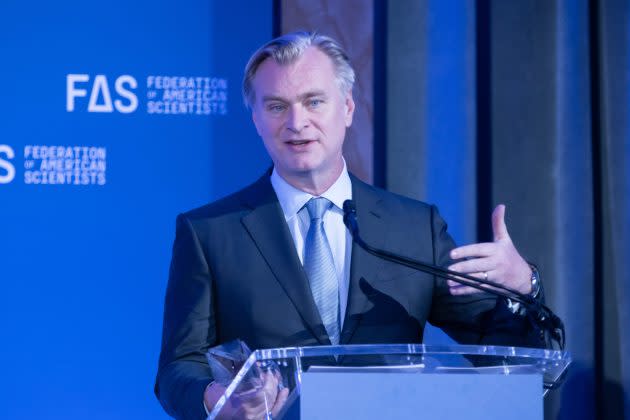Christopher Nolan Talks Importance Of Preserving “Elevated Discourse” In Science As He Accepts Top Honor From Federation of American Scientists – Watch

When Oppenheimer filmmaker Christopher Nolan received the Federation of American Scientists’ Public Service Award earlier this month, in recognition of his cultural contribution by bringing J. Robert Oppenheimer’s story to broader attention through cinema, he made a “plea” to scientists.
At the heart of his speech was a dichotomy between the scientist and the artist, in terms of their relationship to, and dialogue with society at large. As a filmmaker, he explained, you’re given a certain license to manufacture meaning by making a “dramatic choice.” This happened for him on Oppenheimer when grappling with the ending of his story on the invention of the atomic bomb, which depending on his framing, could lean either toward hope for the future of the world, or toward despair. Truthfully, Nolan suggested, the full story of nuclear power continues to be written, well beyond the years his film covers, as geopolitical power shifts and technology continues to evolve. But in any case, his choice was to lean toward despair, out of a desire to “put the audience in the mind of” Oppenheimer, a man haunted by the potential for his work to harm human beings.
More from Deadline
Da'Vine Joy Randolph To Receive Palm Springs Film Festival's Breakthrough Performance Award
'Barbie' Scores 11 Grammy Noms, Including Record Of Year & Two For Song Of Year
The point on Nolan’s part was that if storytellers are allowed to generalize or draw certain conclusions to achieve a specific impact, the general expectation of scientists must be different than that imposed on the artist, or anyone else in society, for that matter. Whereas a filmmaker is expected to come to a project with a concrete, and therefore limited point of view, the difficult and necessary work of a scientist is to wrestle with contradictory ideas and remain open, without rejecting any out of hand. In reality, the work of the scientist is never done, given the likelihood that they’ll be forced to reexamine previously held truths, as new facts continue to emerge.
“Science is truth, and science seeks to disprove itself,” Nolan said. “It’s proud to say when it’s wrong because that means something’s been learned and something’s been improved, and in case it hadn’t occurred to you, or in case you’re wondering, there’s nobody else on earth doing that but scientists.”
The hope on Nolan’s part, as he addressed a room full of scientists, was that professionals in this arena will retain qualities he sees lacking right now in the world at large — the ability to hold contradictory ideas in one’s mind at the same time, and the willingness to perpetually challenge one’s own notions. “When it comes to issues of dialogue around the communication of science, and how that can help our world, and how here in Washington, you are able to interact with policymakers, I would make the plea, please don’t sink to [the public’s] level, Nolan said. “Keep on speaking the truth in the terms in which it needs to be expressed, and if there are complexities and contradictions within that truth, please keep telling the truth and trust that we will find a way to listen.”
The urgency of this message, Nolan said, is that all is sure to be “lost” without preserving the “elevated discourse” consistent with the scientific enterprise. “In a world where everybody is shouting all of the time, science risks losing its voice if it tries to shout as loudly as everybody else does,” he said, “so trust us to find a way to listen to you and keep doing this wonderful thing that you’re doing.”
At the November 16th awards ceremony, Nolan was honored alongside Senators Chuck Schumer and Todd Young, scholar Dr. Alondra Nelson, and scientist Alexa White. Elsewhere in his speech, he spoke to scientists like Kip Thorne that he’s had the “great privilege” of working closely with over the course of his career, among other topics. Check out his remarks in full above.
Best of Deadline
2023 Premiere Dates For New & Returning Series On Broadcast, Cable & Streaming
2023-24 Awards Season Calendar - Dates For Oscars, Emmys, Grammys, Tonys, Guilds & More
Da'Vine Joy Randolph To Receive Palm Springs Film Festival's Breakthrough Performance Award
Sign up for Deadline's Newsletter. For the latest news, follow us on Facebook, Twitter, and Instagram.

